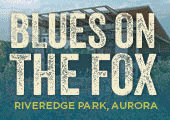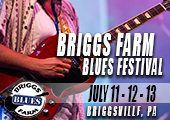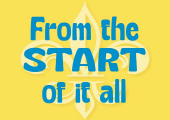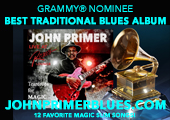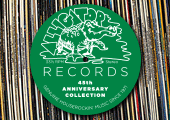SON HOUSE
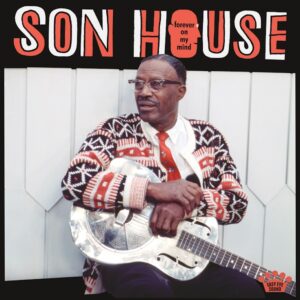 Forever on My Mind
Forever on My Mind
Easy Eye Sound – EES-024
Edward James “Son” House is firmly ensconced in the pantheon of Delta blues artists. His recorded legacy began in 1930 when he made nine sides for Paramount in Grafton, Wisconsin. In 1941 and 1942, Alan Lomax made field recordings of House in rural Mississippi for the Library of Congress. In 1964, when the blues revival was in full swing, those early recordings ultimately inspired a group of blues enthusiasts, Dick Waterman, Nick Perls, and Phil Spiro, to track down the retired singer/guitarist, finally locating him in Rochester, New York. He had essentially given up performing with the move north from Mississippi in the 1940s. House was given a steel-bodied National resonator guitar and coached on how to play his own songs by 22-year-old guitarist Alan Wilson (who would become known through his work in Canned Heat). He signed a contract with Columbia Records and in 1965 recorded the iconic Father of the Folk Blues (reissued in 1992 as Father of the Delta Blues: The Complete 1965 Sessions). Over the subsequent years, recordings of a few live performances have been released, including a 1970 London show Delta Blues and Spirituals (1992) and Son House in Seattle 1968 (2011).
Thanks to a collaboration between Waterman, who became House’s manager, and Black Keys frontman Dan Auerbach, who runs the Easy Eyes Sound label, a previously unheard recording of House from a November 23, 1964, concert at Wabash College in Crawfordsville, Indiana, has been released as Forever on My Mind. Waterman booked a tour in the Midwest, which was how House found his way to Wabash College. The eight tracks that are featured on the recording represent one of the most significant additions to the canon of Delta blues recordings in recent years. The remastered crystal-clear sound rivals the quality of the Columbia recordings. There is no audience sound, and only a few tracks have brief song introductions. The program features five songs that appeared on the original Father of the Folk Blues LP (Preachin’ Blues, Empire State Express, Death Letter, Louise McGhee, and Levee Camp Moan) and two outtakes that were later issued on the complete sessions (The Way Mother Did [Motherless Children] and Pony Blues). The title track was never recorded in the studio. Just five months removed from his “rediscovery,” the Son House who is heard on Forever on My Mind is clearly intent on delivering his repertoire with both fire and precision. Hearing this iconic voice and guitar once again reach out from the past bring the words of poet Al Young to mind: “Believe me, the blues can be volatile too / but the blues don’t bruise; they only renew.”
—Robert H. Cataliotti
SUGARAY RAYFORD
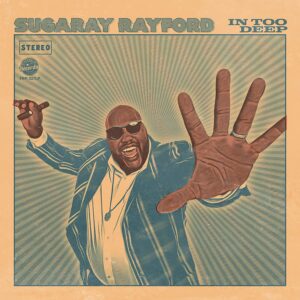 In Too Deep
In Too Deep
Forty Below Records – FBR 027
With a brand of blues that draws from the soulful R&B end of the spectrum, In Too Deep follows on form the creatively successful direction Rayford established on his third solo album, 2015’s Southside. Augmenting a core guitar/bass/keys/drums lineup with a tight and hard-charging horn section, in places In Too Deep also employs instrumentation more readily associated with big bands and orchestras: flute, flugelhorn, violin, and cello.
The album opens on a strong note with Invisible Soldier, a tune that weds a thoughtful, topical lyric to a kinetic and powerful arrangement that combines the best of blues and Memphis-style soul. The stomping title track balances a moody, sinister character with a hypnotic cyclical riff that moves the track along. No Limit to My Love takes things in a different direction: it’s a sweet R&B slow jam of the first order.
Under the Crescent Moon is cinematic in its scope, with a lyric that draws the listener in from the very first line. Tasteful horns and subtle keyboard work add to the song’s assets. The thrilling Miss Information has a Dap-Kings feel. Eamond Ryland’s assured wah-wah guitar and Monette Marino Keita’s hand percussion give the track a vibe reminiscent of the best early ’70s funky soul.
Underscoring the extent to which In Too Deep emphasizes Rayford’s facility in a wide array of styles, Please Take My Hand is suffused with elements of gospel. The chanting background vocals and hand claps evoke mental images of a Sunday service. Other than occasional taps on a cowbell, Please Take My Hand features only those claps, foot stomps, and wordless chanting in support of Rayford’s impassioned lead vocal.
One echoes Bobby Womack, with a stirring string section adding to both the sophistication and emotional content of the song. Gonna Lift You Up is as ebullient as its title suggests, with a delightfully busy Taras Prodaniuk bass line, punchy brass, and a nearly subliminal rhythm guitar that nonetheless helps define the song’s character. Rick Holmstrom—best known as Mavis Staples’ bandleader—adds a sinewy lead guitar solo.
Things get sultry and smooth on Golden Lady of the Canyon, a romantic number almost certainly written to express Rayford’s enduring love for his wife. But In Too Deep ends as it began, with a funky, upbeat, and energetic cut: United We Stand is a statement of optimism that points the way toward Rayford’s future.
Rayford is musically up top, out front, and in command throughout In Too Deep. But praise for the album’s undeniable appeal should also be directed toward Forty Below Records founder Eric Corne. His role in the making of In Too Deep is expansive: Corne produced, engineered, and mixed the album. He also wrote eight of the album’s ten tracks (the other two are co-writes with Rayford).
But In Too Deep remains Rayford’s showcase. The lyrics and music are all in service of his formidable talents as a vocalist. His enthusiasm and energy are matched by his skill at getting across the emotional content of his material.
—Bill Kopp
MUDDY WATERS
 The Montreux Years
The Montreux Years
BMG – BMGCAT519CD
Claude Nobs was a towering figure in popular music. Founder of the Montreux Jazz Festival, he was responsible for bringing a stunning array of performers together year after year on the stages in Switzerland. The second largest annual jazz festival on the planet, since its launch in 1967 Montreux has long taken a big-tent approach, booking artists from most every musical genre.
A new series of releases under the banner of The Montreux Years highlights some of the best music from the festival’s history. One of the latest in the series draws from three concerts featuring Muddy Waters. Sixteen tracks compiled from concerts in 1972, 1974, and 1977 capture Muddy Waters in his prime.
Waters experienced his first commercial success in the 1950s with a run of singles on Chess Records. After a period in the late ’60s in which he seemed to have lost his way musically—tinkering with his approach and releasing acoustic and hard rock recordings—by the start of the 1970s Waters once again found his footing. In that decade he would earn four of his five Grammy Awards for Best Ethnic or Traditional Folk Recording. And he once again found himself a major draw on concert stages.
The Montreux Years serves as a superb live document of many of Muddy’s best-loved tunes: Mannish Boy, Rollin’ and Tumblin’, and Got My Mojo Working among them. The performances on this newly released set also feature songs that Waters recorded for 1974’s “Unk” in Funk, one of his last projects for Chess Records. Muddy sticks mostly to his own material, but when he turns in a reading of someone else’s song—as with Otis Spann’s Nobody Knows Chicago Like I Do—he makes it his own. Waters’ vocals and guitar work are assured, forceful, and exemplary.
The five tracks from 1972 feature veteran Chicago blues band the Aces, consisting of brothers Louis and Dave Myers on guitar and bass, Fred Below on drums, George “Mojo” Buford on harmonica, and Lafayette Leake on keys. Four of the disc’s tracks come from Waters’ second Montreux appearance in 1974, one in which he was backed by a blues rock all-star band including Buddy Guy, Pinetop Perkins, Junior Wells, and Rolling Stones’ bassist Bill Wyman. Wyman and Perkins are on hand for the 1977 tracks as well, joined by another top-notch ensemble including Bob Margolin.
The sound quality is uniformly excellent across the entire disc, and the post-production editing weaves together recordings from three festivals into a seamless document that sounds and feels like a single stellar performance. The intimacy of the high-fidelity recordings often approaches the sharpness of a studio date, with that vibe broken only by the rapturous applause that greets Waters and his band at the conclusion of each number.
The liner notes for Muddy Waters’ The Montreux Years—written by LB Editor Brett Bonner—sum up the disc’s importance in this opening statement: “It seems right that one of the greatest blues artists of all time played at one of the most storied music festivals of all time.” This new collection preserves some of those performances for modern-day listeners. A survey of Muddy Waters at the peak of his powers, The Montreux Years is also a document of a musician and performer who seems to be having the time of his life.
—Bill Kopp
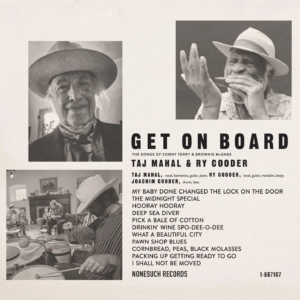 TAJ MHAL & RY COODER
TAJ MHAL & RY COODER
Get on Board: The Songs of Sonny Terry & Brownie McGhee
Nonesuch Records – 1-667167
Although they were prominent figures in the 1960s folk and blues revivals, Sonny Terry and Brownie McGhee are generally not regarded with the same reverence as Mississippi John Hurt, Skip James, or Son House. That may be explained partially because they never really were revived; they migrated to New York in the late 1930s / early 1940s, recording and performing regularly for the rest of their lives. So, they don’t have that “once was lost and now I’m found” cachet that makes the stories of other blues revival artists so compelling. Nevertheless, Terry and McGhee were remarkable musicians who brought authentic country blues into the lives of countless generations of listeners. They have prodigious discographies both as a duo and as solo artists, but they don’t seem to receive the attention that they deserve. Hopefully, the reunion of Taj Mahal and Ry Cooder, two artists who emerged from the 1960s blues revival, on Get on Board: The Songs of Sonny Terry & Brownie McGhee will generate some contemporary interest in these iconic blues artists.
Mahal and Cooder first joined forces back in the mid-1960s in a Los Angeles–based band called the Rising Sons. They recorded a pioneering blues rock album for Columbia in 1965 that remained unreleased until 1992, and Cooder played guitar and mandolin on Mahal’s 1968 debut album. Get on Board is their first time recording together since then. The album is not an attempt to recreate Terry and McGhee’s signature Piedmont blues style. In fact, the subtitle makes it clear that the focus is on their songs and what these two contemporary masters can shape from that material. Both these artists are rooted in the blues, but the trajectories of their careers have collectively ranged far and wide, exploring music from Jamaica to the Tex-Mex border, from Cuba to Mali, and beyond. Joined by Cooder’s son Joachim on drums and bass, they bring that vast array of musical experience to bear on an interesting cross section of the Terry/McGhee repertoire.
The program opens with My Baby Done Changed the Lock on the Door, recast as a funky rocking shuffle with Mahal’s gravel road vocal punctuated by Cooder’s stinging electric slide guitar fills. Lead Belly’s Midnight Special sticks closer to the Terry/McGhee original with Cooder on lead vocal and acoustic guitar and Mahal playing harp fills and singing backup. The mandolin and harmonica opening for Cooder’s vocal on Hooray Hooray brings to mind the singer’s early recordings from albums like Into the Purple Valley. On Deep Sea Diver, Mahal’s barrelhouse piano work accompanying Cooder inspires the singer to exclaim, “Play a little while, Little Brother Taj Montgomery.” The classic Terry/McGhee approach is most faithfully rendered with the hootenanny jam session takes on Pick a Bale of Cotton and Cornbread, Peas, Black Molasses. Mahal’s vocal and harmonica are up front on a stripped-down, funky version of Brownie’s brother Stick McGhee’s 1949 R&B hit Drinkin’ Wine Spo-Dee-O-Dee. Pawn Shop Blues features two acoustic guitars with Cooder singing lead and playing a beautiful slide guitar solo. Packing Up Getting Ready Go is the most “produced” number in the program with its chugging gospel groove, layered background vocals, and bubbling percussion. Terry and McGhee frequently included spirituals in their repertoire, and Mahal and Cooder trade verses on What a Beautiful City and harmonize on I Shall Not Be Moved. With Get on Board: The Songs of Sonny Terry & Brownie McGhee, Taj Mahal and Ry Cooder pay homage to a duo that inspired them all those years ago and show that the blues remain central to their creative impulses.
—Robert H. Cataliotti
 SCOTT ELLISON
SCOTT ELLISON
There’s Something About the Night
Liberation Hall – LIB-5026
Scott Ellison’s tenure as a member of Clarence “Gatemouth” Brown’s touring band was brief, but it undoubtedly left a mark on the Tulsa-based guitarist and singer-songwriter.
Ellison spent a little over a year (1980–81) in the iconic Texas bluesman’s band, but throughout his ensuing four-decade blues/rock solo career, he has consistently channeled Gate’s penchant for being a musical chameleon; easily sliding between full throttle rocker to gut bucket blues belter to purveyor of slick, uptown R&B/blues in less time than it takes to plug a Strat into a humming amp.
Time spent in the 1970s playing with country singer Jesseca James (daughter of country star Conway Twitty) and as a session player for an eclectic mix of artists, such as the Box Tops, the Shirelles, and Peaches & Herb doesn’t hurt in the chops-building process, either. On There’s Something About the Night, Ellison’s 13th solo side, his mastery of styles and tone is on abundant display.
The liner notes say Ellison spent the COVID-19 lockdown woodshedding and writing the 14 songs on the new album that range from rowdy rockers (Blowin’ Like a Hurricane) and slow burn blues (Good Year for the Blues) to smooth R&B (Feast or Famine). Ellison shares co-writer credit on ten tracks with acclaimed soul/blues songwriter Michael Price, who penned legendary singer Bobby “Blue” Bland’s 1974 hit Ain’t No Love in the Heart of the City—which Ellison covers here with soulful honesty.
On the opener, Half a Bottle Down, Ellison declares his allegiance to Jack Black over a chugging shuffle groove powered by his gritty, stinging guitar that recalls late British blues/rock fret master Gary Moore’s tone and attack. He pivots immediately on the title track, a sultry blues workout punctuated by his rough and ready vocals.
Salina mines Texas singer Delbert McClinton’s world-weary savvy of telling detailed stories of relationship entanglements while also displaying the formidable slide prowess that has been a trademark of Ellison’s career. Ellison shows he’s a master at curating inventive arrangements that incorporate horns and creative use of backing vocals on tunes such as Chains of Love, I’m Ready Baby, and Feast or Famine. The closer, Where Do You Go When You Leave, effortlessly transitions from funky jam to no-holds-barred rocker, spiced by ripping guitar from virtuosic British guitarist great Albert Lee.
Something About the Night offers clear evidence that the pandemic gave Ellison the opportunity to cement his status as one of the most versatile—if underrated—blues/rock performers on the scene.
—Rod Evans
BIGLLOU JOHNSON
 Bigman
Bigman
GoldenVoice – No #
BigLlou (or Big Llou) Johnson has garnered some notable achievements over the course of his career—he won the 2013 Blues Music Award as Best New Artist; he has been inducted into the Chicago Blues Hall of Fame; in 2021 he was feted by the Voice Arts Awards for his ongoing voiceover work in commercials—but he has yet to break into “mainstream” blues celebrity.
Johnson cites Chicago as his hometown, and his sound here recalls others who are either from, or have spent significant time in, the city—featuring hot-toned, string-bending guitar solos buoyed by a full-bodied horn section and a simmering, Saturday-night-meets-Sunday-morning organ. Johnson has assembled an impressive array of musicians for this outing; song-by-song credits aren’t provided, but we can be sure that Mark Earley handles the saxophone chores, Doug Woolverton is the trumpeter, and Bill Overton the clarinetist. The lineup also includes such luminaries as fretmen Will Crosby, Jonathan Ellison, and Joe Louis Walker; bassist Felton Crews; drummer Ricky Nelson (who also plays some bass); harpist Russ Green, and violinist Anne Harris (whose sinewy ululations on Sunshine on Yo Face invoke influences ranging from Southern string band and mountain music through Celtic folk to Grappelli-like jazz classicism), among others.
As might be expected from a man who has earned accolades for his voiceover work, Johnson’s gravelly, low-end baritone is mellow and insinuating, oozing sexiness and toughened with hipster irony. Whether singing or murmuring spoken-word imprecations, he’s a master of understatement, summoning deep feeling (and, as on the New Orleans–tinged Shucky Ducky, impishly subversive humor) without seeming to break a sweat. The soloists seem to share his aesthetic: their work is deft and exploratory, yet concise—no ego-tripping, no pyrotechnic overkill.
If the music world (and the world in general) can recover from the setbacks it’s been dealt over the past two years, here’s hoping BigLlou Johnson he can move on from here to attain the recognition he deserves as a first-rate contemporary bluesman.
—David Whiteis
TINSLEY ELLIS
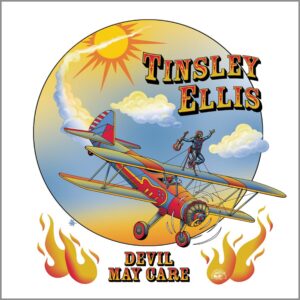 Devil May Care
Devil May Care
Alligator Records – ALCD 5008
Tinsley Ellis has had enough of being cooped up inside as a result of COVID-related gig cancellations. Devil May Care is the result of his defiant declaration to record new music during his downtime and just get out there, come what may. Just as the colorful album cover depicts, this high-flying blues daredevil holds nothing back with his carefully selected choice of original material, culled from a large batch of tunes crafted during the pandemic that crippled the live music industry.
Kevin McKendree does double duty as producer and piano/organist. With Steve Mackey on bass, Lynn Williams on drums, Jim Hoke on saxophone, and Andrew Carney on trumpet, this formidable band provides exactly the right amount of firepower Ellis needs to get his guitar in high gear.
The disc kicks off with One Less Reason, a Green Onions–flavored shuffle with harmonized guitar intro, followed by Tinsley’s gritty vocals that fans have all come to expect. He saves the best for last when his solo really heats up on the outro vamp, as he flame-throws a solo over the harmonized intro.
Right Down the Drain is a slinky tune about a woman who wiped him out—he compares his addiction to her to cocaine, and says he lost both fame and money—“I once felt like superman.” The real highlight of this tune, though, is the fierce guitar battle between Gibson ES-335 slide and hot single-note lead lines from the battered Fender Stratocaster. It’s literally Tinsley vs. Tinsley—and, predictably, they both emerge victorious.
Just Like Rain is a gorgeous, laid-back ballad that has a serious southern Georgia feel. In fact, the melody is built very much like a tune that Gregg Allman would have been quite comfortable crooning on. And, while we’re at it, Tinsley’s captivating solo has all the melismatic charm of both Duane and Dickey. Pound for pound, it’s one of the most articulate performances Ellis has ever delivered.
He picks up the pace again with Beat the Devil, a minor-key blues that is right in his wheelhouse. Sax and trumpet jabs punctuate the background as Ellis tries to outwit the devil himself in the game of love. Meanwhile, McKendree lurks and prowls on a thick, gargling B3 organ. Tinley’s brief but crisp closing solo brings it on home.
Don’t Bury Our Love, tells of a man who’s desperately clinging to fading relationship, the painful paean delivered in a slow, sultry 6/8 swing. “You buried our love down in the clay; it’s not gone, but you’re treatin’ it that way.”
Juju features both acoustic piano and organ from Kevin McKendree, flowing underneath a brief but tasty Allman-flavored slide guitar solo as Tinsley decries, “That juju you used . . . oh, it’s killing me!” The juicy trades between Tinsley’s classic slide riffs and McKendree’s pounding acoustic piano are reminiscent of the legendary exchanges between Betts and Leavell on Brothers and Sisters of 1973.
The horns of Carney and Hoke propel the energetic, Hendrixian hook of the tune Step Up before Tinsley cools things down as he follows the piece with One Last Ride—a tune that really captures just how much of an excellent blues architect Ellis is when it comes to constructing climactic solos.
Ellis gets an exceptionally sweet guitar tone (further enhanced with a soulful wah-wah pedal) he charges through the funky romp of 28 Days. The lyrics are equally as enticing: “My nasty little habit turned into a lifetime of sin—twenty-eight days without you ’bout to do me in.”
Slow Train to Hell is the absolute tour de force that we were all waiting for. As Ellis lets the honey drip from his fingertips, his tear-stained voice matches every bit of emotion captured in his slow, smoky solo. It’s the perfect anti-climax to close this showcase of an album.
Kevin McKendree has once again worked his magic at his Rock House recording studio in Franklin, Tennessee. After being absent from the road for two years, Ellis serves up a dish that fully replenishes the spirit, just as the music was intended to do.
—Wayne Goins
LOUISIANA RED & BOB CORRITORE
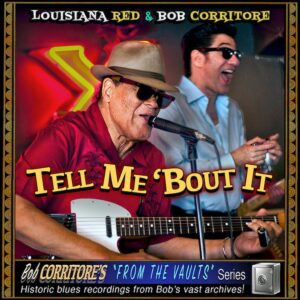 Tell Me ’Bout It
Tell Me ’Bout It
SWMAF Records – SWMAF19
From the vaults of Chicago-cum-Phoenix blues harp ace Bob Corritore comes 11 assorted tracks from sessions chronicled between the years 2000 and 2009 featuring none other than the late Iverson Minter, best known in blues circles as Louisiana Red. Tell Me ’Bout It features excellent performances from Red, supported by a plethora of players—no less than six guitarists, two pianists, and three drummers. But let’s not forget the sole (soul?) harmonica player—Corritore is the ring master of this celebratory blues circus, and his treasury of unreleased songs lends the complementary material that rounds out four previously released tracks under this big top.
A raunchy Chicago-flavored shuffle called Mary Dee Shuffle finds Louisiana Red in fine form with his edgy vocals, and Matt Bishop doing his perfect Otis Spann as he dispenses pearls from his piano. Red’s guitar solo is vintage, and Corritore’s piercing harp solo bounces between the upper-register styles of Jimmy Reed and mid-range fire that Little Walter was known for.
Early Morning Blues is absolutely one of the legitimate takes of Muddy Waters’ Standin’ Round Cryin’. Red’s vocals and guitar work are both outstanding, while Bob nails the overdriven bullet harp to the wall. No drums or bass needed on this one—these two blues brothers tell you all you need to know.
Alabama Train is such a fantastic piece—it drives upward, then shifts downward from a swaggering swing to a straight shuffle of Billy Troiani’s bass and Alex Pattersen’s drums. Red’s vocals lead the charge as the band burns behind him, chugging like the smokin’ train that Louisiana boasts about in the lyrics. Little Victor’s guitar work is stellar, and David Maxwell’s classic Chicago piano style shines like a diamond.
Caught Your Man and Gone conjures aural images of Muddy’s Trouble No More. Underneath the swaggering confidence of Red’s vocals, Corritore’s warble on harp is delicious. Johnny Rapp plays great rhythm guitar, and the duo of bassist Paul Thomas and drummer Chico Chism keeps the groove steady.
Buddy Reed on guitar joins in on the fun for the medium-tempo New Jersey Blues. Reed and Red provide classic South Side, Waters-Rogers style, interweaving guitars as Corritore’s solo takes center stage. Freight Train to Ride is a fantastic tribute to the patented Elmore James genre. Red rises to the occasion once again with his energetic vocals only to be surpassed by his great slide guitar work.
Tell Me ’Bout It offers both the stop time and slow strut of Hoochie Coochie Man, while Earline Who’s Been Foolin’ You features Mario Moreno’s bass and Brian Faley’s drums as they provide the good-time feel in a manner that Hound Dog Taylor certainly would have approved.
Muddy Waters band veteran “Steady Rollin’” Bob Margolin makes a guest appearance and lays down the law on Edith Mae, and the bar is suddenly raised even higher—Red’s vocals are as animated as ever from the joy and excitement he’s feeling on this one. After the penultimate Bessemer Blues, the band takes a final trip to the West Side of Chicago with Bernice Blues, a performance that is as real as anything that originated from 2120 South Michigan Avenue.
This is one of the best blues sets compiled in quite some time—every single track competes for best song on the album.
—Wayne Goins
LADY A
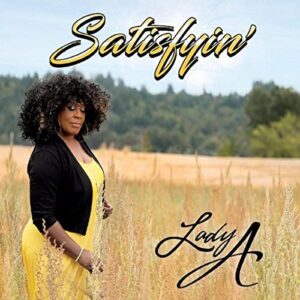 Satisfyin’
Satisfyin’
No label – No #
Vocalist Lady A (née Anita White) made the news a few years ago when the Nashville-based country rock group Lady Antebellum belatedly owned up to the racist implications of their name, announced that they’d changed it to “Lady A,” and then attempted to sue Ms. White over the ownership of a name she’d been using as her stage moniker for decades. She promptly took exception to this, filing a countersuit and releasing the song My Name Is All I Got, while giving multiple interviews to express her outrage. According to the Hollywood Reporter, she and the band have recently agreed to drop all lawsuits, although it’s not clear whether the band will continue to perform and record under that name.
For a woman who’s been immersed in a contentious legal battle for the better part of two years, Lady A sounds remarkably empowered and optimistic. She sings in a grit-flecked, emotionally expressive alto; the musicians she’s chosen can swing, shuffle, and funkify with equal aplomb; her lyric themes tend toward the uplifting and inspirational, especially when she celebrates the grace, beauty, and power of Black women (Big Momma) and the liberating spirit of the living blues tradition (Blues on My Mind). Blues, Soul, Catfish, and Fried Wings expands the scope to take in, not just the music but the entire celebratory feast of life that it encapsulates, especially in the jukes and show lounges where it was born and remains a living presence.
For the People in the Back (All I Got) reprises My Name Is All I Got, complete with her forthright calling-out of the ongoing effects of racism and cultural imperialism on the blues, Black music, and Black culture and people in general. Then, as if to reaffirm the healing power that resonates through that very same music and culture, she concludes with Heaven Help Us, a hope-against-hope hymn that stares down the darkness, despair, and angst of the present moment and dares to suggest that faith might still be redemptive, both for us as individuals and for this broken world in which we live—and sometimes, through it all, still dance.
—David Whiteis
MISTY BLUES
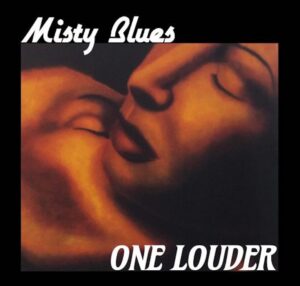 One Louder
One Louder
Lunaria Records – Lunda 0010
Gina Coleman, founder and lead vocalist for the band Misty Blues, sings from her soul. It’s hardly a surprise. She got her start in the early ’90s as lead singer for a folk/rock group called Cole-Connection and later went on to play the role of a gospel singer in a theater production of A Raisin in the Sun. She became convinced that singing the blues was her true destiny after being urged by one of her fellow actors to pursue the possibilities. When Mandy Patinkin and Gwyneth Paltrow expressed similar thoughts after catching her performance in the play, that was all it took to convince Coleman that a shift in stance was warranted. After joining forces with guitarist Jason Webster and bassist Bill Patriquin, her former bandmates in Cole-Connection, Misty Blues was born. Eventually, guitarist Seth Fleischmann replaced Webster, and keyboard player Ben Kohn, drummer Rob Tatten, and sax player Aaron Dean joined the fold, resulting in the assured strut and shuffle they deliver so decidedly.
Based in the Berkshires, Misty Blues pays homage to the vintage sounds parlayed by the bold and brassy women who took center stage in the ’20s, ’30s, and ’40s, an era that found a merging of blues and jazz as America’s primary musical motif. Now, with ten albums to their credit, Misty Blues has become a formidable force in their own right, as their new effort, One Louder, demonstrates so decidedly.
Not surprisingly, Coleman remains the main draw, and on songs such as A Long Hard Way, Freight Car, Birch Tree, and Leave My Home, her blustery vocals and emotive engagement give each offering a powerful and provocative presence. Coleman is not only capable of expressing her shared sentiment, but also emitting a sound so stirring that it rumbles and resonates with both assurance and intensity. So too, when Coleman shares the microphone with guest Big Llou Johnson on their searing duet, How the Blues Feels, the gritty delivery affirms the truth of its title.
Likewise, the funk-fueled Do My Thing gives her mantra a further focus.
Ultimately, One Louder offers the impression that it is, in fact, a decidedly essential album, one that evokes a shimmering, soulful sound that represents the blues at its basics. It would be hard to imagine any set of songs leaving a more indelible impression.
—Lee Zimmerman







